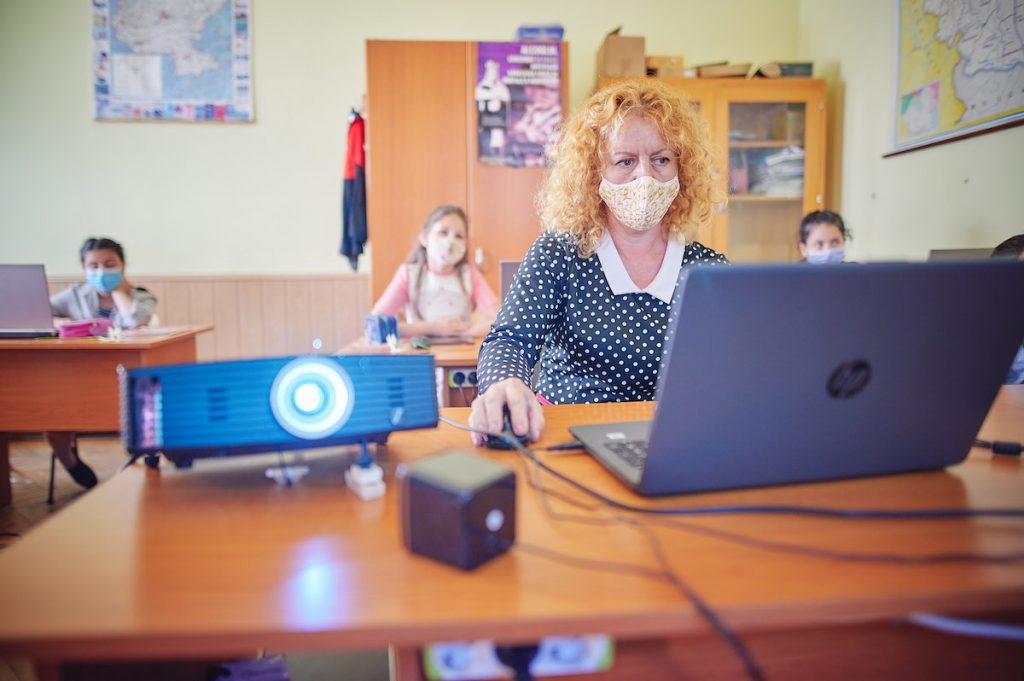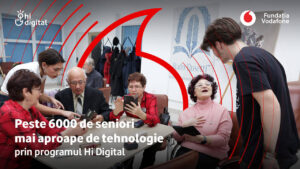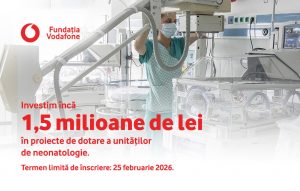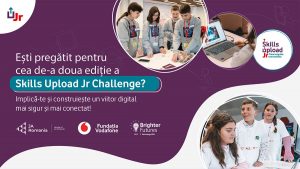The teachers included in the School in a Box programme are trained to create digital content on the Moodle platform
Bucharest, January 17th, 2022: Around 68% of teachers in rural areas state that improving their digital skills is the primary benefit they gained within the context of online schooling due to the pandemic, according to a survey carried out by World Vision Romania and Vodafone Foundation. The main difficulties faced by teachers in creating digital content were: the time needed to create a digital lesson (68%), the lack of information concerning the apps they can use to create content (30%), the lack of motivation after many online classes (29%), the lack of lesson templates which they could use for inspiration (26%) and the lack of digital skills (23%).
In this context, the teachers included in the “School in a Box” programme, carried out by World Vision Romania and Vodafone Romania Foundation with the aim of improving the digital skills of teachers and students in rural areas, spend four months learning to use Moodle, the most frequently used educational management system worldwide and the platform on which the “School in a Box” programme is based.
The teachers are trained to create classes, interactive content as books/ lessons/Wikis, how to manage the content created or how to use H5P to create content. In each session, teachers prepare practical lessons applying the functionalities they were taught.
The digital content may be used during offline teaching, when classes are being held at school, as well as during online classes, when students learn from home.
The programme will be running until April 2022.
The benefits of online schooling for students and teachers
The main benefits of teachers in rural areas in the difficult context in which school was conducted online in the past two years were: significantly improving their digital skills (68%), knowing their students better, as well as their living conditions (32%) and also the fact that students could continue learning even though it was hard for them (61%), shows the same survey.
Also, 19% of the teachers feel like they have grown closer to their students despite the physical distancing and 16% of the teachers appreciated the fact that students kept their webcams on during online classes.
A slow internet connection – the main difficulty with online schooling
On the other hand, the challenges faced by teachers in the context of online schooling were: a weak internet connection (61%), them and the students being tired after many weeks of online schooling (40%), the fact that students often had their cameras off (31%), the lack of control over students’ activities during class (27%) and teachers having to handle more tasks at the same time (27%).
12% of teachers state that they did not have the necessary technology to teach online and the same percentage claim that it was hard for them to create digital content because they did not know how to do that. For 9% of teachers, it was hard to keep the quiet considering that their own children were at home, while 7% did not feel comfortable at all using the technology required for online teaching.
Teachers’ motivation: their students’ attention and good test results
Teachers were motivated to create digital content by the fact that students were paying much more attention when they were taught using digital lessons (61%), their performance was better during classes where they also used digital content (30%), they were paying more attention and got better grades for the tests taken on the tablet (29%), as well as because students also ask other teachers to create digital lessons, therefore taking them out of their comfort zone (19%).
The survey was carried out between December 2021 and January 2022 on a sample of 200 teachers from rural areas, who benefitted from the “School in a Box” programme.
“School in a Box” ensures a 360-degree approach to digital education. The programme supports teachers and students in rural areas to develop their digital skills through free access to the e-learning platform www.scoaladinvaliza.ro and access to a “technology suitcase” equipped with tablets, laptops and internet access and also through the continuous professional training of teachers. At the same time, the programme helps teachers become more self-confident, create and conduct interactive digital lessons, and helps students prepare for an increasingly technology-dominated labour market. This way, teachers transform the school, students enjoy learning more and develop to meet the challenges of the future. “School in a Box” stands for accessible and quality digital education.
World Vision Romania is part of the World Vision International partnership, present in almost 100 countries around the world. World Vision Romania is a foundation that carries out emergency humanitarian intervention, development and advocacy programmes, placing the welfare of children at the center of its activity. The Foundation focuses on working with children, families and communities in order to overcome poverty and injustice. Inspired by Christian values, the foundation works with the most vulnerable people in the world, regardless of religion, race, ethnicity or gender. In its almost 30 years of activity in Romania, the foundation has helped over 500,000 children and adults in 400 communities in 8 counties. For more details about the foundation: www.worldvision.ro, www.facebook.com/WorldVisionRomania, blog.worldvision.ro/.
The Vodafone Romania Foundation is a Romanian nongovernmental charitable organisation, established in 1998, which operates separately and independently from the company’s business. Over more than 20 years of activity, the Vodafone Romania Foundation has funded 1,168 programs run by 765 NGOs throughout the country, in the fields of healthcare, education and social services. These projects had more than 3 million beneficiaries – children, young and old people, physically, socially, or economically disadvantaged people. So far, the Vodafone Romania Foundation has invested 31 million euros in projects run by non-profit partner organizations. More details about the Foundation’s programs are available at www.fundatia-vodafone.ro, http://jurnaldebine.fundatiavodafone.ro/ and www.facebook.com/fundatiavodafone.




